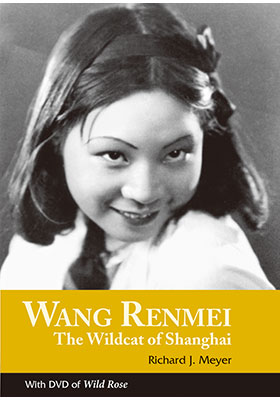Wang Renmei
The Wildcat of Shanghai (With DVD of Wild Rose)
(王人美:上海野貓)
ISBN : 978-988-8139-96-5
July 2013
204 pages, 5.5″ x 7.5″, 43 b&w illus.
- HK$195.00
Also Available on
Wang Renmei was on a fast track to become one of China’s leading film stars in the 1930s. Her early films were received with magnificent praise by audiences and critics alike, though she later lamented that she became famous too early and never had a chance to properly study acting. The film Song of the Fishermen in which she sang and played a major role was the first Chinese motion picture to win an International Award in Moscow in 1935.
Wang’s personal struggles reflected the turbulent period from the end of the Qing dynasty to the rise of Deng Xiaoping. This study explores her artistic achievements amid the prevalent anti-feminist and feudal society in China prior to the founding of the People’s Republic in 1949—attitudes which contributed to the downturn of Wang’s promising career and forced her to accept various bit parts among the more than twenty films in which she appeared. In addition, personal problems as well as the Anti-Rightist Movement and the Cultural Revolution led to her hospitalization for mental illness. Wang’s life is emblematic of the experiences of many left-wing and Communist Party members from the Shanghai film community who were viewed with suspicion and enmity by the Yan’an clique headed by Mao and later the Gang of Four. Wang’s performances in World War II for the Nationalist troops as well as her work with the US forces in China had a dire effect on her career after 1949. Yet today, her films are being discovered again.
“Meyer always writes in an accessible, jargon-free style that invites all interested readers to share his enthusiasm and knowledge for the films he loves so much within their richest historical and cultural context. Thanks to this wonderful book, the Chinese actress Wang Renmei and the film Wild Rose will no longer be obscure within the English-speaking world of film scholarship.” —Peter Lehman, director of the Center for Film, Media and Popular Culture, Arizona State University, and co-author of Thinking About Movies: Watching, Questioning, Enjoying
“Wang Renmei is one of the most dynamic and talented film actors in Chinese history, full of tensions and self-contradictions that revealed in part the violence and turmoil of her times and the political complexity of the film industry. This fine book on one of China’s most exciting film artists will appeal to both scholars and general readers interested in early Chinese cinema.” —Poshek Fu, professor of history, University of Illinois at Urbana-Champaign
“As well as giving her biography, Wang Renmei: The Wildcat of Shanghai includes synopses of every film, transcripts of the interviews that Meyer conducted with her friends and colleagues, and credits for all of her films, as well as some details on their availability. This meticulous scholarship makes the volume both an enjoyable introduction tot he star for the general reader and an important scholarly resource.” —Chris Berry, King’s College London
About the DVD
Wild Rose 野玫瑰
[Ye Meigui] 1932
Xiao Feng or “Little Wind,” played by Wang Renmei, is a young girl who has lost her parents. Jiang Bo, played by Jin Yan, is a wealthy painter who discovers Xiao Feng in a small fishing village and makes her his model. When Xiao Feng is left homeless after a fire destroys her home, Jiang takes her to Shanghai to live with his parents, but Xiao Feng is later expelled from the mansion by Jiang’s father because she cannot act the part of a sophisticated Shanghainese.


